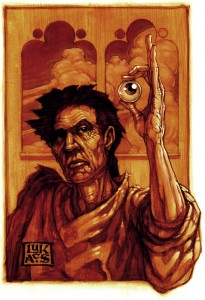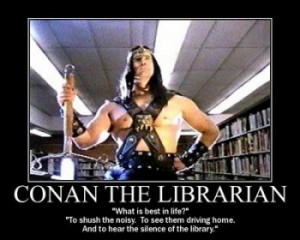 What is the proper setting for heroic fantasy? Sometimes it seems that the Heroic Age is like the Golden Age of Science Fiction: twelve (according to the now-elderly wisecrack).
What is the proper setting for heroic fantasy? Sometimes it seems that the Heroic Age is like the Golden Age of Science Fiction: twelve (according to the now-elderly wisecrack).
Anyway, it is widely agreed that heroic fantasy is set in some age before we learned that “digital watches were a pretty neat idea”, a period frequently described as the Middle Ages.
And this is almost perfectly dumb.
For one thing, not every age without highly developed machines is medieval. How about Hawaii before the Europeans got there? How about a post-machine age (apocalyptic or otherwise)? How about the pre-medieval world? In any case, magic is itself a kind of science and/or technology, and it may pervade the world of a heroic fantasy.
Then there’s the question of what the Middle Ages are, anyway. Broadly, they are a chunk of time in western Europe after the fall of the Roman Empire and before the Renaissance.
The Roman Empire, as we know, fell when Constantinople was captured by the Turks in 1453 AD (or CE, if you prefer). The Renaissance can be said to have begun with the recovery of classical learning in Europe, a process we can date to the 12th century AD. So the Middle Ages never existed, since they could only have begun after they must have ended, and the adjective “medieval” has no useful meaning. I have proved this with science.
In truth, what most people think of when they hear “medieval” is some sort of Neverneverland of knights in chrome armor clanking around in a thickly-beprincessed landscape that may or may not contain dragons. That Middle Ages certainly never existed, and few if any fantasy stories actually use such a setting.
I’m not one of those crying out against the use of settings based on medieval Europe. They can’t be overdone, because they are hardly ever done. That is, not enough fantasies really seem to come to grips with the knotty details of particular historical situations. Whose Middle Ages are we talking about, anyway? A Florentine living in a democratic city-state, worried about encroachments by the Papacy from the south or the unholy dubiously Roman Empire from the north, was having a very different Middle Ages than a Norwegian working as a Varangian Guard in the Byzantine Empire.
Middle Ages is a question-begging term invented by supercilious pricks in the early modern period who wanted to sweep a thousand years of human history under the rug of the Enlightenment. It’s time to beat that rug and let the truth rise up in a gritty stinking cloud. (I’m not sure what that metaphor means, but I’ll leave it there in the hope it means something.)
The truth about fantasy (heroic or otherwise) is that it’s not set in the Middle Ages at all. It’s set, as Ursula Le Guin says in a short but thoughtful essay “in an alternate reality.” (The essay is “Some Assumptions about Fantasy” collected in Cheek by Jowl.)
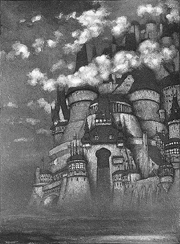 The alternate reality of a fantasy may echo some part of historical reality… or may not. Dunsany’s “The Hoard of the Gibbelins” or “The Fortress Unvanquishable, Save for Sacnoth” are deeply and deliberately set in the realms of Neverneverland.
The alternate reality of a fantasy may echo some part of historical reality… or may not. Dunsany’s “The Hoard of the Gibbelins” or “The Fortress Unvanquishable, Save for Sacnoth” are deeply and deliberately set in the realms of Neverneverland.
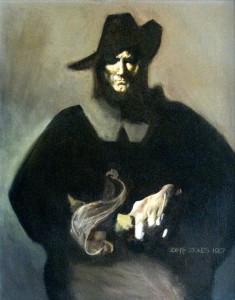 Robert E. Howard’s tales of Solomon Kane are set in a nightmare version of the 17th century.
Robert E. Howard’s tales of Solomon Kane are set in a nightmare version of the 17th century.
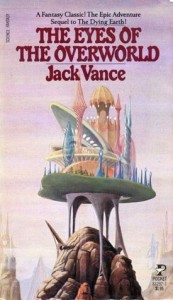 Jack Vance’s series about Cugel the Clever takes place in a far future, just before the death of the sun. Poul Anderson’s Operation Chaos and its sequel featured a secret-agent werewolf and his witch wife who adventured through an alternate 20th century where magic was real.
Jack Vance’s series about Cugel the Clever takes place in a far future, just before the death of the sun. Poul Anderson’s Operation Chaos and its sequel featured a secret-agent werewolf and his witch wife who adventured through an alternate 20th century where magic was real.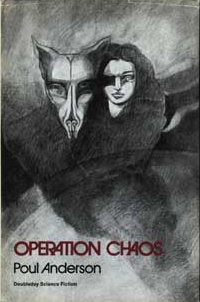
In short, any setting will work for heroic fantasy… as long as it actually works.
This gives heroic fantasists a lot of freedom to craft their worlds, but places a heavy responsibility on their shoulders. Everything that goes into an imaginary world is the writer’s choice. I wouldn’t suggest that the writer create any kind of utopia (they’re tough to tell decent stories about), but it’s worth thinking about every inequity or social justice we put in place in the worlds we make. History can be used as a mine for useful things that will help the maker make a world, but it shouldn’t be used as a get-out-of-jail-free card for a lazy writer. (“That’s just the way Vikings act.) Nor can it be used as a chain on the writer’s imagination. (“Vikings don’t act like that!”)
In a perfect world, there might not be any need for heroes. So let’s consign perfect worlds to the hell they so closely resemble and settle for creating interesting worlds, enriched by the complexities of history but not bounded by them.
[In memoriam: Lawrence Joseph Pfundstein jr. Requiescas in pacem, optime patrum.]

